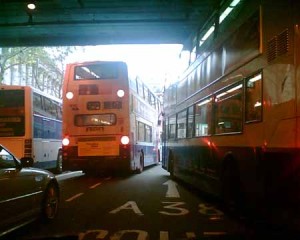Yesterday’s news that a woman from Birmingham has been jailed for eight weeks for spitting at a bus driver showed that, hopefully, crime on the region’s public transport is being taken seriously.
This is often a subject for debate, particularly on the Stirrer and ReStirred forums over recent years, which is hardly surprising as there can be few of us who don’t use the region’s public transport network at some time. It may not be perfect, but it’s usually reliable, fairly cheap, and as punctual as can be expected. However, it’s also often dirty, and while dangerous would be an exaggeration, uncomfortable isn’t.
I’ve used public transport, particularly local buses, quite a bit around the country and I rarely get the feeling of apprehension and borderline lawlessness that I often get here. Getting on a bus in Birmingham, particularly in the evening, is often an adventure – Noise from music or from other passengers, smoking (invariably drugs), drunkenness, occasional fights. Local residents don’t deserve this, and visitors must get an appalling impression. Trains are usually a bit more peaceful, but a lot dirtier. This doesn’t happen in, say, Liverpool (where signs warning rail passengers from even putting their feet on seats seems to have done the trick) or London, where, despite its many built-in preconceptions, public transport is often a pleasure rather than an endurance test.
To my mind the root cause of the problem is that no-one seems particularly bothered about tackling it. I’ve said before that travelling on a bus in Birmingham after dark is like attending a football match in the eighties. The chances of being a victim of any sort of crime are statistically low, but there’s a good chance you’ll at least witness if not actually be part of an unpleasant scene and the general feeling of all concerned is that it serves you right for being there.
Crime linked to the region’s bus network apparently dropped 19% last year. That may sound impressive, but it still doesn’t take away the fear of becoming a statistic, or of getting caught up in something that won’t be recorded because it isn’t a crime, but still makes life unpleasant for other passengers. For example, one recent comment in a survey on transport safety described anti-social behaviour on the buses as having become “normalised”.
Most crime can be stopped by increasing the chances of getting caught. It sounds simple, but it’s true. Initiatives such as the Safer Travel Partnership, targeting crime hotspots and troublesome bus routes on the network, are fine in practice but it would be interesting to know, right now, how many uniformed police officers and PCSOs are travelling on the local transport network and how many working CCTV cameras there are on our buses and trains.
If you want people to travel by public transport you have to make them feel safe. If they’re on a bus in the company of fellow passengers taking drugs, arguing or playing loud music, or on a train surrounded by free newspapers and discarded fast food wrappers they’ll feel uncomfortable no matter how many stories they read about falling crime rates and prison sentences. Or is it our fault for being there in the first place?



